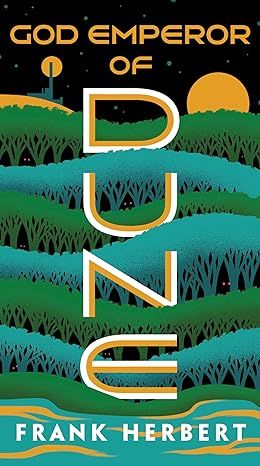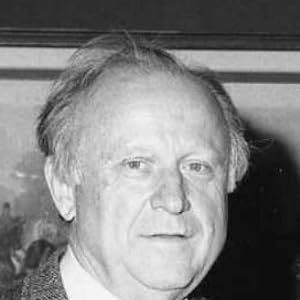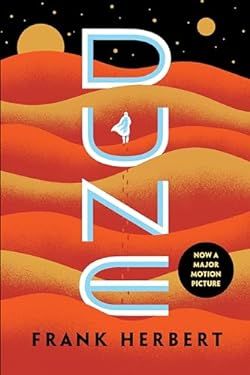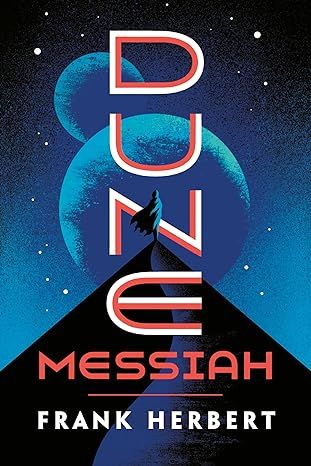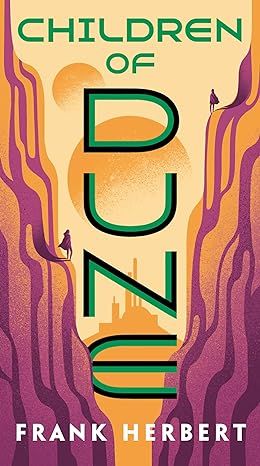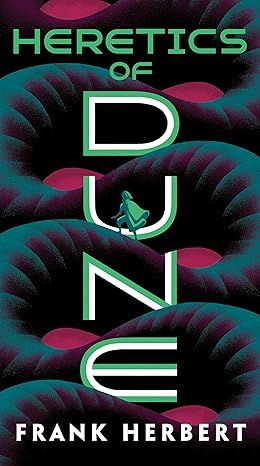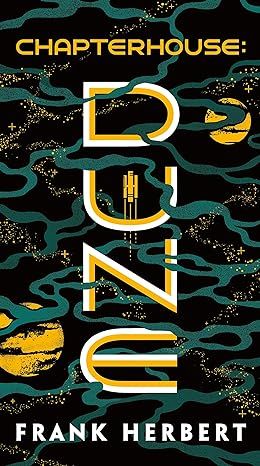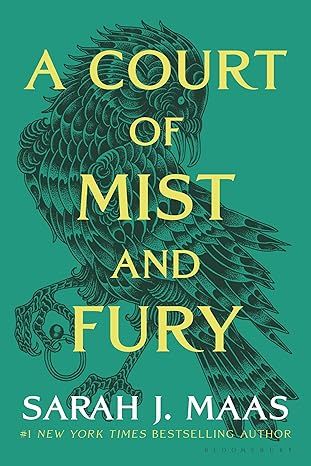God Emperor of Dune
4.4
-
11,255 ratings
Book Four in the Magnificent Dune Chronicles—the Bestselling Science Fiction Adventure of All Time
Millennia have passed on Arrakis, and the once-desert planet is green with life. Leto Atreides, the son of the world’s savior, the Emperor Paul Muad’Dib, is still alive but far from human. To preserve humanity’s future, he sacrificed his own by merging with a sandworm, granting him near immortality as God Emperor of Dune for the past thirty-five hundred years.
Leto’s rule is not a benevolent one. His transformation has made not only his appearance but his morality inhuman. A rebellion, led by Siona, a member of the Atreides family, has risen to oppose the despot’s rule. But Siona is unaware that Leto’s vision of a Golden Path for humanity requires her to fulfill a destiny she never wanted—or could possibly conceive....
Kindle
$9.99
Available instantly
Audiobook
$0.00
with membership trial
Library Binding
$40.95
Paperback
$8.99
Ships from
Amazon.com
Payment
Secure transaction
ISBN-10
0593098250
ISBN-13
978-0593098257
Print length
608 pages
Language
English
Publisher
Ace
Publication date
June 03, 2019
Dimensions
4.25 x 1.3 x 7.5 inches
Item weight
2.31 pounds
Frequently bought together
Popular Highlights in this book
This wise man observed that wealth is a tool of freedom. But the pursuit of wealth is the way to slavery.
Highlighted by 3,334 Kindle readers
Most believe that a satisfactory future requires a return to an idealized past, a past which never in fact existed.
Highlighted by 2,183 Kindle readers
Never attempt to reason with people who know they are right!
Highlighted by 600 Kindle readers
Product details
ASIN :
B001F0WXX6
File size :
2224 KB
Text-to-speech :
Enabled
Screen reader :
Supported
Enhanced typesetting :
Enabled
X-Ray :
Enabled
Word wise :
Enabled
Editorial Reviews
Praise for God Emperor of Dune
“Rich fare...Heady stuff.”—Los Angeles Times
“A fourth visit to distant Arrakis that is every bit as fascinating as the other three—every bit as timely.”—Time
Praise for Dune
“I know nothing comparable to it except Lord of the Rings.”—Arthur C. Clarke
“A portrayal of an alien society more complete and deeply detailed than any other author in the field has managed...a story absorbing equally for its action and philosophical vistas.”—The Washington Post Book World
“One of the monuments of modern science fiction.”—Chicago Tribune
“Powerful, convincing, and most ingenious.”—Robert A. Heinlein
“Herbert’s creation of this universe, with its intricate development and analysis of ecology, religion, politics and philosophy, remains one of the supreme and seminal achievements in science fiction.”—Louisville Times
Sample
This morning I was born in a yurt at the edge of a horse-plain in a land of a planet which no longer exists. Tomorrow I will be born someone else in another place. I have not yet chosen. This morning, though—ahhh, this life! When my eyes had learned to focus, I looked out at sunshine on trampled grass and I saw vigorous people going about the sweet activities of their lives. Where . . . oh where has all of that vigor gone? —THE STOLEN JOURNALS
The three people running northward through moon shadows in the Forbidden Forest were strung out along almost half a kilometer. The last runner in the line ran less than a hundred meters ahead of the pursuing D-wolves. The animals could be heard yelping and panting in their eagerness, the way they do when they have the prey in sight.
With First Moon almost directly overhead, it was quite light in the forest and, although these were the higher latitudes of Arrakis, it was still warm from the heat of a summer day. The nightly drift of air from the Last Desert of the Sareer carried resin smells and the damp exhalations of the duff underfoot. Now and again, a breeze from the Kynes Sea beyond the Sareer drifted across the runners�’ tracks with hints of salt and fishes.
By a quirk of fate, the last runner was called Ulot, which in the Fremen tongue means “Beloved Straggler.” Ulot was short in stature and with a tendency to fat which had placed an extra dieting burden on him in training for this venture. Even when slimmed down for their desperate run, his face remained round, the large brown eyes vulnerable in that suggestion of too much flesh.
To Ulot it was obvious that he could not run much farther. He panted and wheezed. Occasionally, he staggered. But he did not call out to his companions. He knew they could not help him. All of them had taken the same oath, knowing they had no defenses except the old virtues and Fremen loyalties. This remained true even though everything that once had been Fremen had now a museum quality—rote recitals learned from Museum Fremen.
It was Fremen loyalty that kept Ulot silent in the full awareness of his doom. A fine display of the ancient qualities, and rather pitiful when none of the runners had any but book knowledge and the legends of the Oral History about the virtues they aped.
The D-wolves ran close behind Ulot, giant gray figures almost man-height at the shoulders. They leaped and whined in their eagerness, heads lifted, eyes focused on the moon-betrayed figure of their quarry.
A root caught Ulot’s left foot and he almost fell. This gave him renewed energy. He put on a burst of speed, gaining perhaps a wolf-length on his pursuers. His arms pumped. He breathed noisily through his open mouth.
The D-wolves did not change pace. They were silver shadows which went flick-flick through the loud green smells of their forest. They knew they had won. It was a familiar experience.
Again, Ulot stumbled. He caught his balance against a sapling and continued his panting flight, gasping, his legs trembling in rebellion against these demands. No energy remained for another burst of speed.
One of the D-wolves, a large female, moved out on Ulot’s left flank. She swerved inward and leaped across his path. Giant fangs ripped Ulot’s shoulder and staggered him but he did not fall. The pungency of blood was added to the forest smells. A smaller male caught his right hip and at last Ulot fell, screaming. The pack pounced and his screams were cut off in abrupt finality.
Not stopping to feed, the D-wolves again took up the chase. Their noses probed the forest floor and the vagrant eddies in the air, scenting the warm tracery of two more running humans.
The next runner in the line was named Kwuteg, an old and honorable name on Arrakis, a name from the Dune times. An ancestor had served Sietch Tabr as Master of the Deathstills, but that was more than three thousand years lost in a past which many no longer believed. Kwuteg ran with the long strides of a tall and slender body which seemed perfectly fitted to such exertion. Long black hair streamed back from his aquiline features. As with his companions, he wore a black running suit of tightly knitted cotton. It revealed the workings of his buttocks and stringy thighs, the deep and steady rhythm of his breathing. Only his pace, which was markedly slow for Kwuteg, betrayed the fact that he had injured his right knee coming down from the man-made precipices which girdled the God Emperor’s Citadel fortress in the Sareer.
Kwuteg heard Ulot’s screams, the abrupt and potent silence, then the renewed chase-yelps of the D-wolves. He tried not to let his mind create the image of another friend being slain by Leto’s monster guardians but imagination worked its sorcery on him. Kwuteg thought a curse against the tyrant but wasted no breath to voice it. There remained a chance that he could reach the sanctuary of the Idaho River. Kwuteg knew what his friends thought about him—even Siona. He had always been known as a conservative. Even as a child he had saved his energy until it counted most, parceling out his reserves like a miser. In spite of the injured knee, Kwuteg increased his pace. He knew the river was near. His injury had gone beyond agony into a steady flame which filled his entire leg and side with its burning. He knew the limits of his endurance. He knew also that Siona should be almost at the water. The fastest runner of them all, she carried the sealed packet and, in it, the things they had stolen from the fortress in the Sareer. Kwuteg focused his thoughts on that packet as he ran. Save it, Siona! Use it to destroy him!
The eager whining of the D-wolves penetrated Kwuteg’s consciousness. They were too close. He knew then that he would not escape.
But Siona must escape!
He risked a backward glance and saw one of the wolves move to flank him. The pattern of their attack plan imprinted itself on his awareness. As the flanking wolf leaped Kwuteg also leaped. Placing a tree between himself and the pack, he ducked beneath the flanking wolf, grasped one of its hind legs in both hands and, without stopping, whirled the captive wolf as a flail which scattered the others. Finding the creature not as heavy as he had expected, almost welcoming the change of action, he flailed his living bludgeon at the attackers in a dervish whirl which brought two of them down in a crash of skulls. But he could not guard every side. A lean male caught him in the back, hurling him against a tree and he lost his bludgeon.
Read more
About the authors
Frank Herbert
Frank Herbert (1920-86) was born in Tacoma, Washington and worked as a reporter and later editor of a number of West Coast newspapers before becoming a full-time writer. His first SF story was published in 1952 but he achieved fame more than ten years later with the publication in Analog of 'Dune World' and 'The Prophet of Dune' that were amalgamated in the novel Dune in 1965.
Read more
Reviews
Customer reviews
4.4 out of 5
11,255 global ratings
Bryan Desmond
5
The Leto Experience. The Worm Who Is God.
Reviewed in the United States on May 3, 2020
Verified Purchase
God Emperor of Dune. The Leto Experience. The infamous. The impenetrable. It boggles the mind, this book. It is something that my 15 year old self was not ready for. I get something new out of these books each time I read them, and I was especially looking forward to reaching this one, as I have only read the back three books once each. Suffice it to say, reading this book was an entirely different experience this time around.
God Emperor is without a doubt the most divisive book in the series. You sometimes see it hailed as a fan's favorite book in the series, other times as utter drivel that should be the stopping point for all readers. It's interesting, really. I'm not quite ready to claim it as the high point of the series, but I will say that I loved it. And while there were plenty of pieces of this puzzle that still went over my head, so much more of it landed. I am a firm believer that when you read a book is as important as reading it in the first place. And I may not have the memories of my ancestors to call on or a prescient vision to guide me, but I found my right time.
I have been jokingly referring to this book (using Leto's own words) as 'The Leto Experience', rather than its actual title. The entire book is a trip. Truly, it felt like Frank Herbert found a storehouse of the spice melange before writing it and partook heavily during the process. The frame-story is noted by the discovery of the journals of the God Emperor Leto Atreides II, some 1,500 years after his death. The story we read then, is taken from the contents of these journals. This story is 3,500 years after the reign of Paul Muad'dib, and so right away a reader's expectations are blown apart. This is by far the biggest time gap in the series to date, but (once again) it is necessary for the story Frank wants to tell. I (do and) don't want to dive deeper into what the story is about because I think there is something to be said for the discovery by the reader of just how much has changed since the time of Paul. An enforced tranquility hangs over the universe, a suppression of freedom. Leto holds to his Golden Path for the good of mankind, but there are some who name him tyrant.
It must be said though, God Emperor is unlike anything that came before it. It is still unequivocally Dune but... more so. It is dense with knowledge and absolutely stuffed with information. 90% of the book is just dialogue. This did not bother me because among Herbert's many writing strengths I think that conversation is one of his greatest. If conversation bores you though that would be a deal-breaker for this book. I must admit though, it is hard for me to imagine being uninterested in the conversations within. Dialogue between Leto and the Duncans, Leto and Moneo, Leto and Hwi Noree, Leto and Siona, Leto and his ancestral memories, even Leto and his own imagination. I think one has to give it up to Frank Herbert for what he has created in the character Leto Atreides II. I mean, it's hard to imagine a being living for 3,500 years. What a being like that would be like. And yet... Leto feels so believable. One must remember that this isn't just a matter of age, either, but of ancient memory, and intimate knowledge of the future. What would it do to someone to have perfect knowledge of their ancestral memories, going back into time immemorial? What would it be like to be so closely associated with the future of one's universe? You'd grow bored. Emotion would fall away, replaced by an implacable intellectual resolve. You would crave novelty, treasuring every surprise. Herbert represents this state of being remarkably well in Leto. Now, if Dune and Dune Messiah were Herbert showing readers the dangers of a charismatic leader, then God Emperor is him showing us a universal tyrant in the long term. He does this in such a compelling way because he gives us an omniscient look at the why behind Leto. Because rest assured, from almost any other point of view the oppression he serves up to the universe is tyrannical indeed. But, as silly as it sounds, this is tyranny with a purpose. The terrible purpose that Paul brushed up against but could not fulfill. That awful purpose that requires Leto to give up his very humanity to achieve it, for the good of his kind. He is both hated and worshiped for it, and it is completely fascinating.
I can't really do justice to the complex and infinite nature of God Emperor of Dune with a simple Goodreads review, but I would urge potential readers to not be deterred from reading it because of external opinions. I think it is something to be read and judged for oneself. I think this book, more than any other in the series, has Frank himself shine through the pages the clearest. I understand that it bothers people (and frankly the book isn't without its faults, and Frank has a few unfortunate, outdated opinions) but it is an ambitious feat, if nothing else.
"You have faith in life. I know that the courage of love can reside only in this faith."
Read more
66 people found this helpful
Monika A Kruger
5
Best Dune book
Reviewed in the United States on May 4, 2024
Verified Purchase
I really liked the book. It's not an easy read but very thought provoking. A must read for Dune fans.
2 people found this helpful
sallyklemm
5
Book
Reviewed in the United States on May 11, 2024
Verified Purchase
God Emperor of Dune was a great gift for my nephew Jason. He really enjoyed getting it from me for his birthday.
Taylor Hathcock
4
An amazing shift for the series
Reviewed in the United States on May 21, 2024
Verified Purchase
“When the myth dies, the government dies.”
So this one had a huge time jump and a new cast of characters... other than Leto II, but he's so different at this point he feels new. I have to say that this one might be my second favorite. I think it was incredibly different than the first three in the writing style and tone. It's less focused on the ecology and politics of Arrakis. It just all feels like a different type of book. I loved that it was more of like a history/mythology type thing in a way. I think that the writing style of this one is much easier to follow than the first three. I also enjoy that it shifts focus on the topics it finds important. I liked the gender dynamic in this one a lot. I really feel like this one was harder to put down than some of the others and I honestly am dying to see what comes next in the series because of this one.
In this one Leto pretty much is a tyrant, but is determined to follow his Golden Path, that will prove him one day to be a savior. Everyone sees Leto as a God and he helps to cultivate this image. What I found incredibly interesting was how much Leto actually hated his role. It was interesting to watch how much he loathed the way he was worshipped. Leto's plan has involved him taking over the Bene Gesserit breeding plan and he seems to have created an array of citizens who have the characteristics he deems most important.
The Atreides line continues on and it appears a lot of them have been rebels who he has one over to his side over the years. I also love that Leto's military is made up of women because he sees them as more able to protect society than destroy it. Siona is an amazing new character. I love her rebel spirit and that despite her connections to the God Emperor she never seems to waiver from her goal to destroy him at all costs. She is probably one of the best female characters I've seen in this series.
Read more
jorge
3
No book cover included
Reviewed in the United States on May 2, 2024
Verified Purchase
The book itself seems to be in good condition. My only issue is the lack of a cover on the book. All the photos on the listing show the cover and when I got the book in the mail the cover was not on the book. Not a Major issue but still a little annoyed that the listed showed the product one way and delivered it another.
Story itself is great. Very underrated entry into the dune series.
Read more
Top Frank Herbert titles
Similar Books
Best Sellers

The Great Alone: A Novel
4.6
-
152,447
$5.49

The Four Winds
4.6
-
156,242
$9.99

Winter Garden
4.6
-
72,838
$7.37

The Nightingale: A Novel
4.7
-
309,637
$8.61

Steve Jobs
4.7
-
24,596
$1.78

Iron Flame (The Empyrean, 2)
4.6
-
164,732
$14.99

A Court of Thorns and Roses Paperback Box Set (5 books) (A Court of Thorns and Roses, 9)
4.8
-
26,559
$37.99

Pretty Girls: A Novel
4.3
-
88,539
$3.67

The Bad Weather Friend
4.1
-
34,750
$12.78

Pucking Around: A Why Choose Hockey Romance (Jacksonville Rays Hockey)
4.3
-
41,599
$14.84

Start with Why: How Great Leaders Inspire Everyone to Take Action
4.6
-
37,152
$9.99

Tomorrow, and Tomorrow, and Tomorrow: A novel
4.4
-
95,875
$13.99

Weyward: A Novel
4.4
-
27,652
$11.99

Tom Lake: A Reese's Book Club Pick
4.3
-
37,302
$15.74

All the Sinners Bleed: A Novel
4.4
-
12,894
$13.55

The Mystery Guest: A Maid Novel (Molly the Maid)
4.3
-
9,844
$14.99

Bright Young Women: A Novel
4.2
-
8,485
$14.99

The Wager: A Tale of Shipwreck, Mutiny and Murder (Random House Large Print)
4.5
-
28,672
$14.99

Hello Beautiful (Oprah's Book Club): A Novel (Random House Large Print)
4.4
-
79,390
$14.99

Small Mercies: A Detective Mystery
4.5
-
16,923
$10.00

Holly
4.5
-
31,521
$14.99

The Covenant of Water (Oprah's Book Club)
4.6
-
69,712
$9.24

Wellness: A novel
4.1
-
3,708
$14.99

The Art Thief: A True Story of Love, Crime, and a Dangerous Obsession
4.3
-
4,805
$14.99
